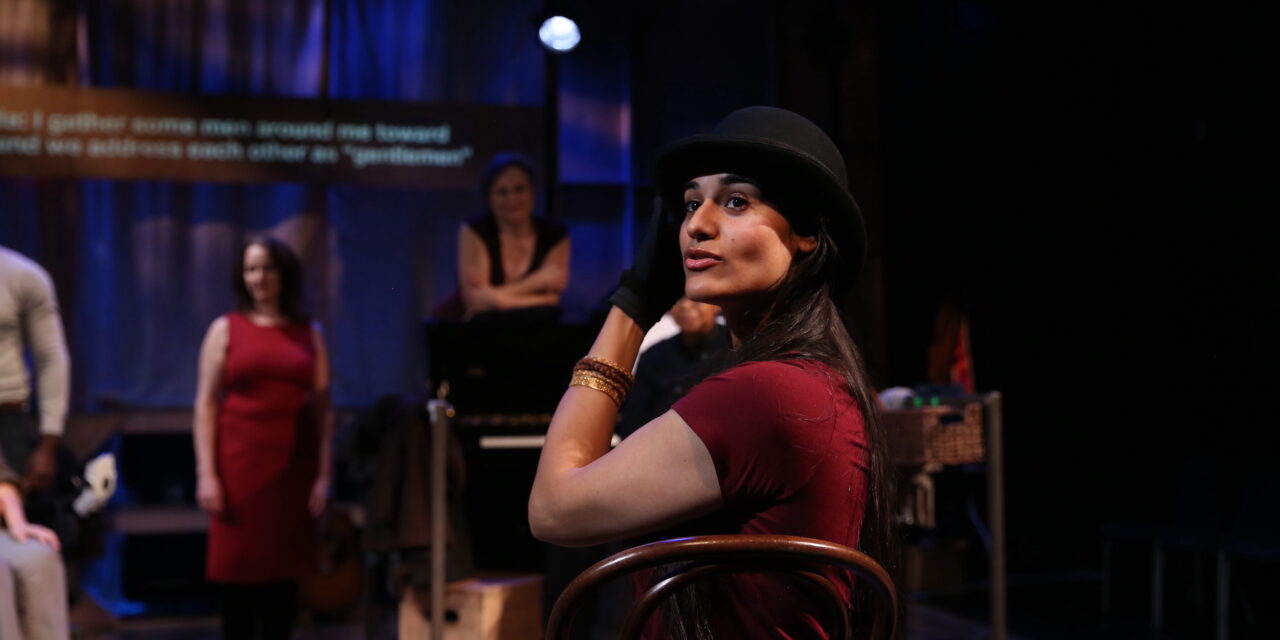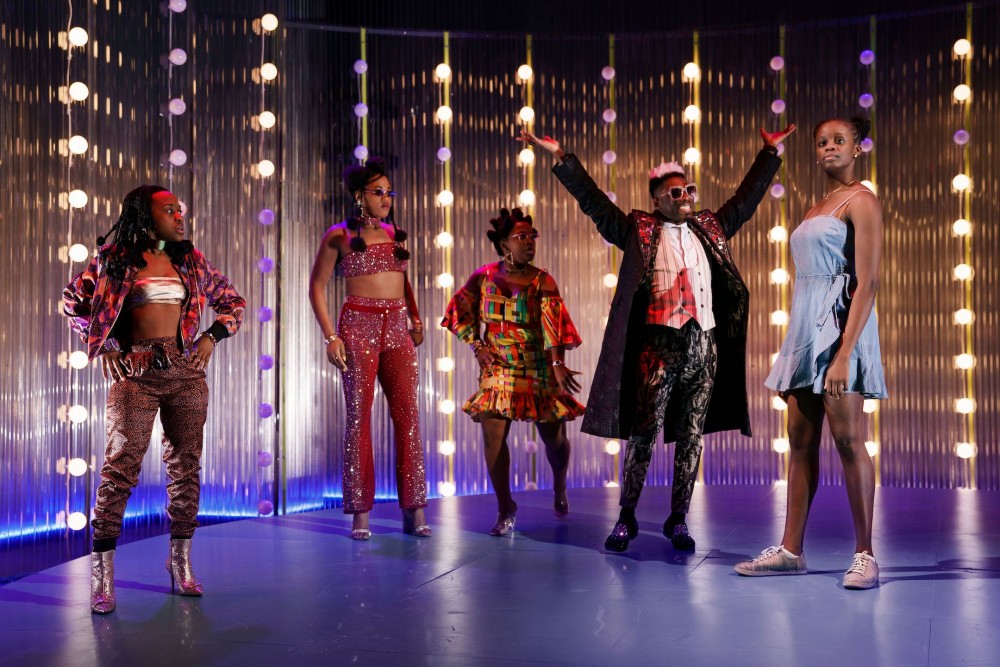By Samuel L. Leiter . . .
Brecht on Brecht, a literary collage with a cabaret cachet, was first produced, to acclaim, in January 1962, shortly after Bertolt Brecht and Kurt Weill’s 1928 The Threepenny Opera had concluded its seven-year run at the same theatre, the Theatre de Lys (now the Lucille Lortel). It was revived twenty years ago, in the wake of 9/11, by Theatre Breaking Through Barriers, an Off-Broadway company “dedicated to advancing artists and developing audiences of people with disabilities.” TBTB, under the direction of Nicholas Viselli, is also behind the current revival, subtitled, questionably, “A Celebration of Life Lived in Defiance,” at A.R.T./New York Theatres.
As noted below, the present script is only partly the same as that of the original. One of the remaining selections, “On Critics,” addresses those who damn with faint praise. “The direction is masterful, but it ruins the play. The play is profound in its conception, but it doesn’t work.” Critics hearing such expressions will smile at their familiarity, even though they might use others to quibble over the present work.
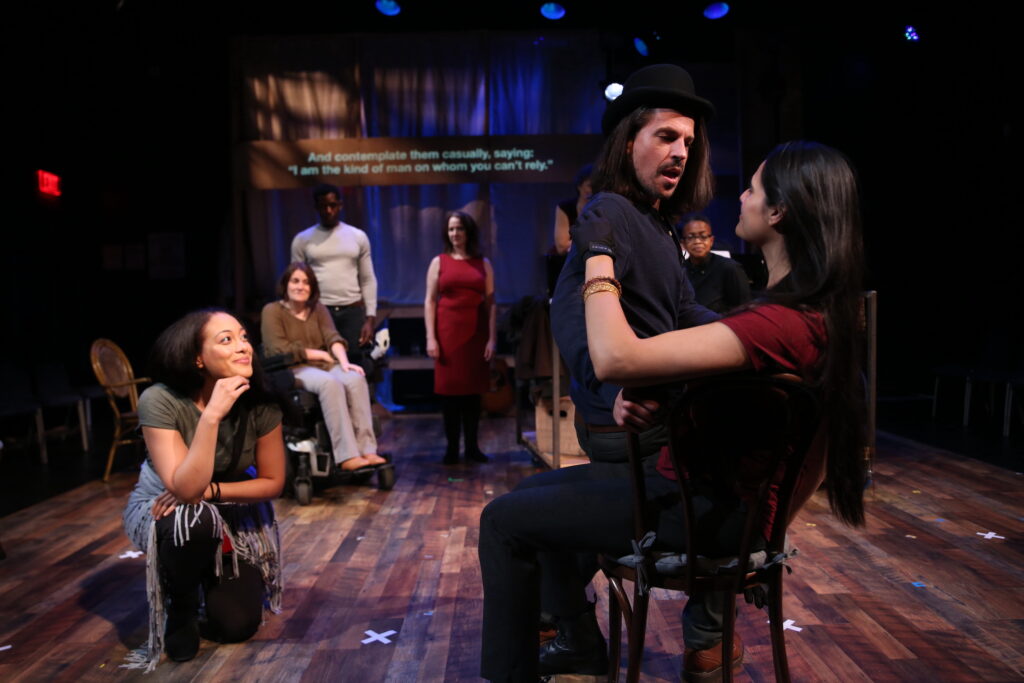
In 1962, German playwright/poet Bertolt Brecht (1898-1956), who had died six years earlier, was the hottest name in international theatre, despite his only commercial success in New York being the aforementioned Threepenny revival. And, naturally, it owed as much to Weill’s now classic score (think “Mack the Knife”) as to Brecht’s political satire.
Nonetheless, a posthumous tsunami of academic interest evolved about him, especially regarding his widely popularized concepts, including terms like “epic theatre” and “verfremdungseffekt” (usually rendered as “estrangement” or “the alienation effect”). By 1962, when I graduated from college, I’d already acted in a production of one Brecht play, directed another, and was soon to direct a third for my MFA.
Although significant Brecht productions soon began to invade New York, most floundered, at least commercially. It’s a problem that has, by and large, persisted. Even today, for all his reputation, Brecht remains a niche attraction.
Brecht on Brecht, a revue-like assembly of his poems, stories, songs, and dramatic scenes, however, was a hit, scoring 424 performances. Compiled by Hungarian-born playwright George Tabori, it employed a stellar cast of American and lightly-accented Continental actors: Anne Jackson, George Voskovec, Dane Clark, Michael Wager, Viveca Lindfors (Tabori’s wife), and Lotte Lenya, a full-blooded member of Brecht’s inner circle.
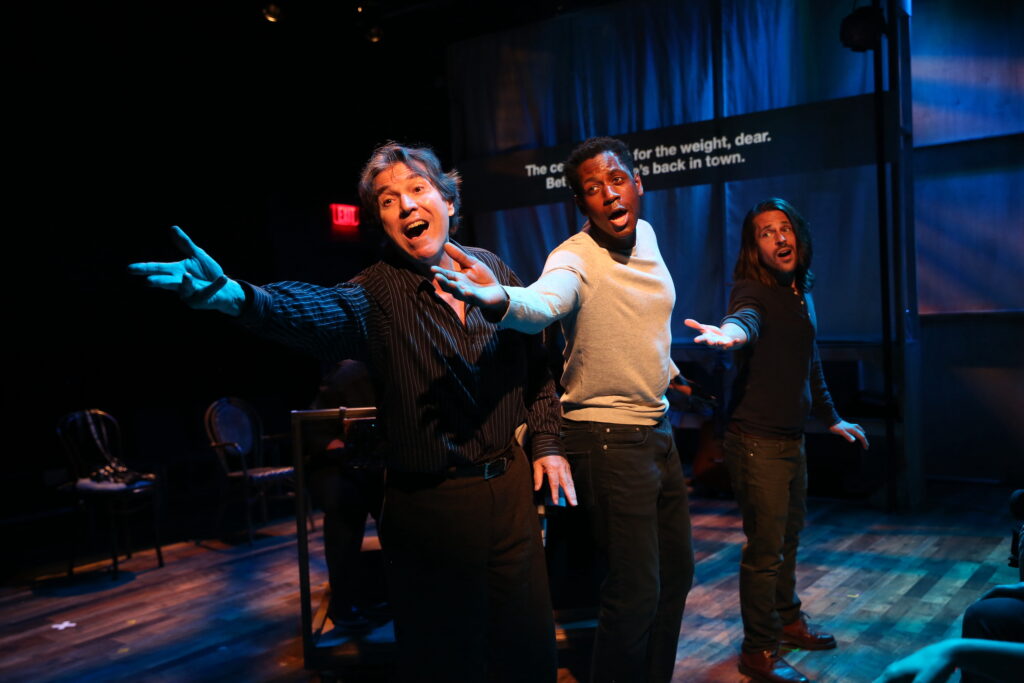

Those familiar with the 1962 version, as recorded on vinyl, will be disappointed to find that it has been considerably revised here. The program for the revival, which clocks in at ninety intermissionless minutes, continues to credit Tabori, who died in 2007, as the arranger. Perhaps a program note might explain why this version differs so greatly from the original, and whether another hand is responsible for the changes. A program note about Brecht might also help visitors unfamiliar with his life and politics.
In 1962, Gene Frankel’s proscenium staging placed its six script-holding thespians on conventional wooden stools—readers’ theatre-style—with occasional movement for visual interest; there were also projected titles and a large photo of Brecht, looking on sardonically. Viselli uses a three-quarters-round setting, designed and lit by Bert Scott, with sound design by Eric Nightengale and costumes by Courtney E. Uruyo. Looming on the rear wall much of the time is an assembly of Brecht headshots—the projections are by Samuel J. Biondolillo. Open-captioning of the script is a helpful nod to hearing-impaired theatregoers.
The nine actors, who open the show with self-descriptions for the seeing-impaired, are Fareeda Pyracha Ahmed, Scott Barton, Stephen Drabicki, Ann Flanigan, Anita Hollander, Ann Marie Morelli, Sean Phillips, Pamela Sabaugh, and Dionne McClain-Freeney, who is also the musical director. While the company is a bit uneven, all are spirited, and several possess strong singing voices. Viselli, making much use of a rolling piano, keeps them moving. This revival, in fact, is surprisingly physical, but even those with mobility issues handle it well.
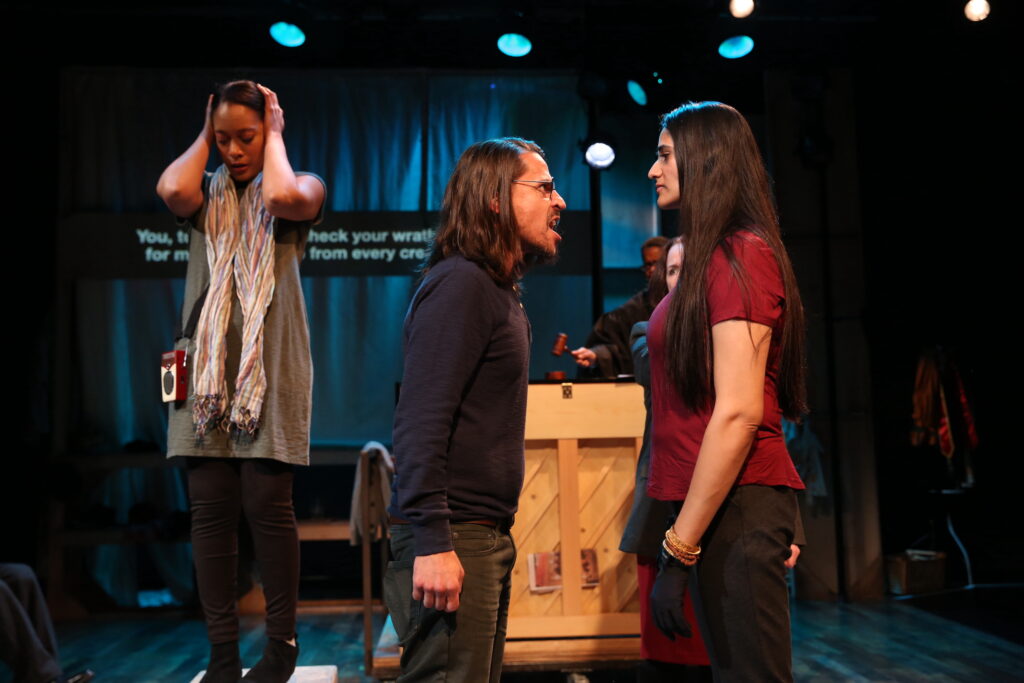

Questionably, Viselli has taken those longer selections once intended for single-actor presentation and broken them up into quasi-mini-dramas for multiple performers. It’s a choice that diffuses the focus of the writing, particularly in the misconceived “Concerning the Infanticide, Marie Farrar.” This potent tale of an unintended pregnancy’s consequences has been chopped up into bite-size pieces delivered by the ensemble as if they were courtroom attorneys circling around the accused, standing on a pedestal, under a judge’s watchful eye.
Two tour-de-force selections in the 1962 script have been deleted. One is “The Old Hat,” about the extraordinary effort an actor goes through to find just the right hat for his four-minute role. The other is “The Jewish Wife,” a powerful scene (brilliantly done by Viveca Lindfors) extracted from a lesser play (The Private Life of the Master Race), in which a Jewish woman in 1930s Nazi Germany prepares to tell her non-Jewish husband she’s leaving for a safer place.
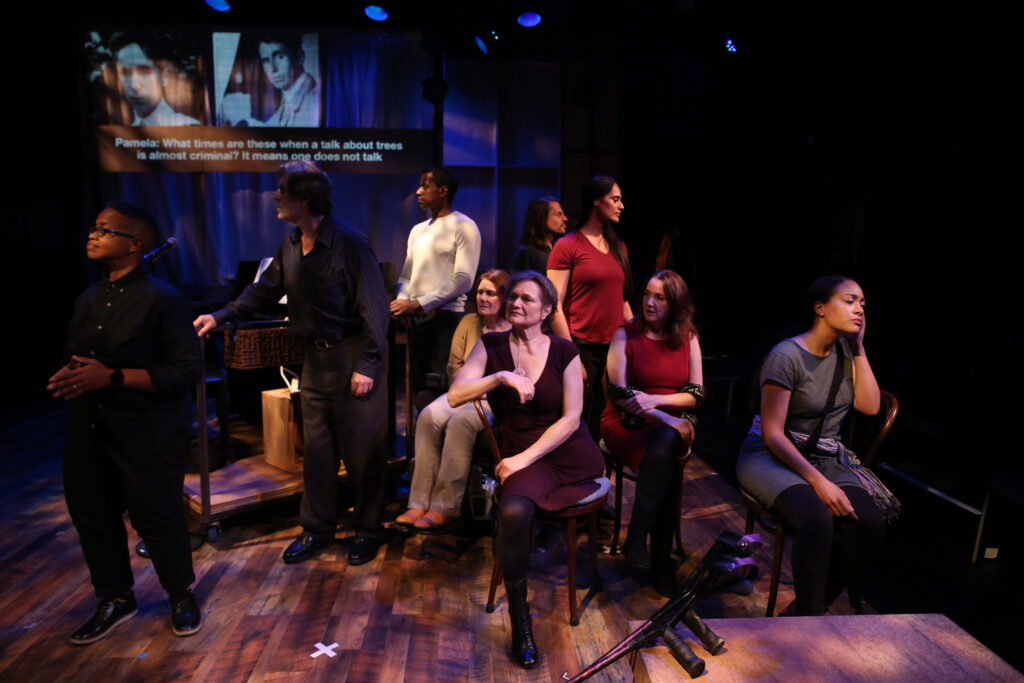

Replacements include songs like “Surabaya Johnny,” bits from Mother Courage and Galileo, and a host of frequently ambiguous poetic passages. Many of the latter are too difficult at first hearing to make Brecht’s points immediately clear. Brecht, a cunningly elusive communist, testified before HUAC in 1947, and snippets of his recorded testimony, spoken in slow but accurate English, remain from the original arrangement; they’re now supplemented by videos of him speaking. On the other hand, we no longer hear—except when we’re leaving, and then only barely—Brecht’s recording of “Die Moritat von Mackie Messer,” in his slyly cutting tone with the “r” in “Messer” rolled for all it’s worth. In its place, the company provides an unmemorable, jazzed-up choral rendering in the familiar “Mack the Knife” mode.
Subjects like immigration, abortion, scientific facts, poverty, wealth, and the like carry a topical relevance, of course, helping to justify the revival. Some of the new stuff clearly has been chosen for such purposes. But for all its earnestness, its pertinence, and the exertions of its enthusiastic company, you may find yourself experiencing the verfremdungseffekt of being cerebrally estranged rather than emotionally involved. Somehow, I don’t think that’s what TBTB had in mind.
Brecht on Brecht: A Celebration of Life Lived in Defiance. Through November 20 at A.R.T./New York Theatres, 502 West 53rd Street (between Tenth and Eleventh Avenues) W. 53rd Street. www.tbtb.org
Photos: Carol Rosegg


